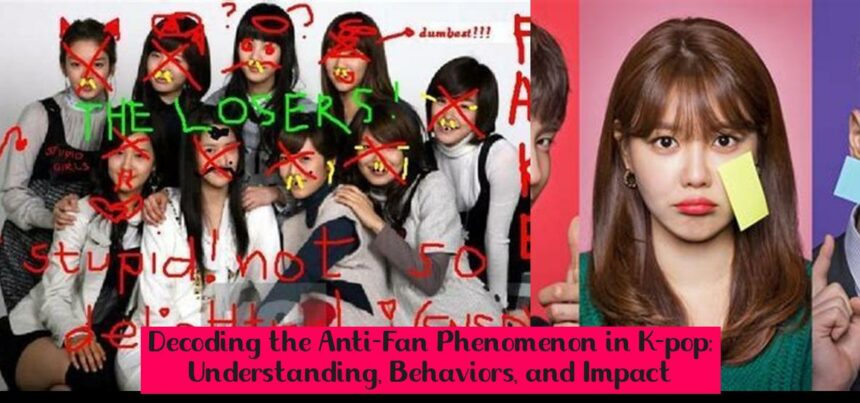Unveiling the Mystery of Anti-Fans in K-pop: Exploring the Enigmatic World of K-pop’s Most Notorious Critics
Are you curious about the enigmatic world of K-pop anti-fans? Wondering who they are and what drives their fervent criticism? Join us as we delve into the fascinating phenomenon of anti-fans in the K-pop community, uncovering their behaviors, impact, and the intriguing dynamics they bring to the vibrant world of K-pop. Whether you’re a die-hard K-pop enthusiast or simply intrigued by the intricacies of fan culture, this exploration is bound to pique your interest!
Key Takeaways
- An anti-fan in K-pop refers to someone who hates a particular celebrity or group and devotes their time to mocking and criticizing them.
- Anti-fans enjoy writing, discussing, or creating derivative works solely for the purpose of railing against or parodying a piece of media.
- Examples of anti-fans can be found in the opposition to popular works like Harry Potter and the Twilight series in the United States.
- K-pop fans are known as “K-poppers” and are individuals who commit to a one-sided relationship with K-pop idols, developing an intimate attachment to them.
- Anti-fans may engage in activities such as infiltrating other fandoms to cause trouble, leading to fan wars and conflicts within the K-pop community.
- Anti-fans are individuals who follow the activities and content of an artist or group they hate, often to express their strong dislike and opposition.
Anti-Fans in K-pop: Understanding the Phenomenon
Reading List: BoyNextDoor: Unveiling the Phenomenon of Popularity in Korea
In the vibrant and dynamic world of K-pop, the term “anti-fan” holds significant relevance. These individuals, driven by an intense dislike for a particular celebrity or group, dedicate their time and energy to mocking, criticizing, and expressing hostility towards their chosen target. This blog post delves into the fascinating realm of anti-fans in K-pop, exploring their motivations, behaviors, and the impact they have on the K-pop community.
Anti-Fans: Who Are They and What Drives Them?
An anti-fan, also known as an “anti,” is someone who harbors a strong aversion towards a specific celebrity or group in the K-pop industry. Their actions are characterized by a relentless pursuit of negativity, often expressed through online platforms and social media. Anti-fans may engage in various activities to express their disdain, such as spreading rumors, creating disparaging content, and actively working to undermine the reputation of their target.
The motivations behind becoming an anti-fan can vary widely. Some individuals may harbor personal grudges or perceive the celebrity or group as a threat to their favorite artist or group. Others may simply enjoy the thrill of participating in online controversies and fan wars. Regardless of their reasons, anti-fans exhibit a pattern of obsessive behavior, dedicating an inordinate amount of time and energy to their chosen target.
Behaviors and Strategies of Anti-Fans
Anti-fans employ a range of strategies to express their disapproval and spread negativity. These tactics often involve:
- Online Harassment: Anti-fans frequently engage in online harassment, using social media platforms and online forums to spread malicious comments, insults, and personal attacks against their target.
- Boycotts and Petition: Some anti-fans organize boycotts and online petitions to pressure companies, brands, and organizations to sever ties with their targeted celebrity or group.
- Sabotaging Events: Anti-fans may attempt to sabotage events, concerts, or fan meetings by disrupting the proceedings, causing chaos, or spreading false information.
- Infiltrating Fan Clubs: In some cases, anti-fans may infiltrate fan clubs or online communities dedicated to their target, posing as genuine fans to spread discord and sow division.
Impact of Anti-Fans on the K-pop Community
The presence of anti-fans can have a profound impact on the K-pop community, both positive and negative. On the positive side, anti-fans can serve as a catalyst for increased awareness and support for the targeted celebrity or group. The backlash against anti-fan behavior often galvanizes fans to rally around their favorite artists, resulting in increased engagement, sales, and popularity.
However, the negative consequences of anti-fan behavior can be severe. The constant barrage of criticism and negativity can take a toll on the mental health and well-being of targeted celebrities and their families. Anti-fans can also create a toxic and hostile environment for fans, discouraging participation and engagement in the K-pop community.
Read Also : Sasaeng Fans: Unveiling the Disturbing Obsession of Korean Fan Culture
Conclusion
Anti-fans are a complex and intriguing phenomenon within the K-pop industry. Their actions can have both positive and negative consequences, highlighting the importance of promoting a healthy and supportive fan culture. It is crucial for fans to recognize the harmful effects of anti-fan behavior and to actively counter their efforts by spreading positivity and promoting respect and unity within the K-pop community.
What is an anti-fan in K-pop?
An anti-fan in K-pop refers to someone who hates a particular celebrity or group and devotes their time to mocking and criticizing them, often creating derivative works solely for the purpose of railing against or parodying a piece of media.
What is an example of an anti-fan?
An example of an anti-fan can be found in the opposition to popular works like Harry Potter and the Twilight series in the United States. These individuals are staunchly critical of a piece of work and set out to build consensus about the dangers, absurdity, or immorality of said work.
What are Korean fans called?
Korean fans of K-pop are known as “K-poppers” regardless of the specific group or artist they support. While K-pop fans call each other by fandom-specific names, such as Blink, Army, Stay, or Henecia, the term “K-poppers” is often used by those who aren’t fans of this musical style to refer to those who are.
What is a K-pop fan?
A K-pop fan is defined as someone who commits to a one-sided relationship with K-pop idols, developing an intimate attachment to them and engaging in fan activities as members of various K-pop fandoms—communities built around a shared enjoyment and interest in K-pop idols.







